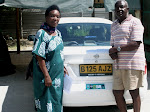

Saturday
Easter is a markedly holy time and an occasion for a four-day weekend in Botswana. Government, the schools, the banks, they all shutter their doors. Even the Pick n Pay supermarket closed on Good Friday.
I admit to being confused over specifics and the paradox. While Puni was preparing to go to a Maundy Thursday service at her Methodist Church Thursday night, I was standing in what can only be called a stampede at the Liquorama. I was there to buy Windhoek Lager for the Secheles. Puni likes a “shindi” now and then, which involves mixing a couple of dollops of Sprite with the lager. Sechele prefers his Windhoek straight up, preferably from a glass bottle because the cans “give it a tinny taste.” If Liquorama were a bank, you’d think there had been a run on the market. The tiniest, well-dressed women with bright red lipstick were hauling mountains of beer, wine and liquor out the door. I tapped my foot, waiting, waiting, inching along for about 30 minutes to check out. I’d never seen anything like the amount of alcohol purchased in such a short time, except maybe at the TOG at Wake Forest the night after winter break.
I’m in the midst of the holiday weekend, so no doubt I will better understand how the Easter tradition all unfolds by Tuesday. But I can give you the highlights: It’s party time. And yet it’s not. They take their Christianity seriously around here, just as they do their partying.
Puni wasn’t kidding when she said she might be late from the Thursday service. She left at 9 p.m., and Sechele picked her up at 1 a.m. Sometimes the service goes all night. I wasn’t invited to that one, which is understandable since I am comatose by 9:30. (Oh, how far has fallen the girl who once went out 31 nights in a row in college and didn’t start drying her hair until 10:30 p.m. before going dancing.)
I did, however, accept the invitation to attend the “Seven Words of the Cross” service at Puni’s church – the Methodist Church of Southern Africa: Gaborone Circuit -- on Friday morning. Sechele was heading to his cattle post, so it would be Puni, the housekeeper Maria and I who were off to the worship service. Puni came to my room wearing a black skirt, colored pantyhose, a red long-sleeved polyester shirt with a large, pointy, white, sailor-like collar and a knit white cap that resembled what newborn babies wear at the hospital. This outfit designated the prayer group. When I got to the church I saw dozens of women dressed like Puni. At 8:45 a.m. they were already in the pews waving their arms and singing. This was going to be amazing. And I was right. By the time we had squeezed every person into every pew, had white plastic lawn chairs set up in the aisle and in the breezeway, we must have been in the wedged company of 600 people. Fans whirred overhead, except, of course, the one over my head. It was broken. Once in a while a breeze would blow through, and we needed it because we were packed tighter than my suitcases.
Puni brought 3 hymnals, one in Setswana, one in !Xhosa and one in Sothu. The service alternated among several languages and dialects, as far as I could tell. I followed along as a minister read the story of the Crucifixion from the New Testament in English. Then the drama began, unlike anything I’ve seen at any Methodist church in America.
A male minister and a female minister told the crucifixion story in their own words, with their own flourishes and a creative take on history. One would speak English for a while as the other spoke Setswana and vice versa. So it was at once a duet and a two-person play. With their loud descriptions, you could envision every bead of sweat on Jesus’ brow, every bit of agony. The woman described the size and make of the executioner’s whip and snapped her arm; she cried out how the whip exposed the muscles and how it exposed the organs as it struck blow after blow on Jesus’ back. We heard a lot about blood. Jesus was “a man on mission,” the woman minister said. He “did not throw in the towel.” The executioner carried a bag made of skin! The ministers shouted, repeating for dramatic effect: “A bag of skin!” In response a choir member lifted a black pocketbook overhead and waved it around a bit, to nice effect. The parishioners, including me, were spellbound throughout this dramatic storytelling.
“Mission accomplished!” the ministers said in ending the crucifixion scene. You could see the ministers’ exhaustion. I think we all felt it. Then there was some more singing.
“This was like that movie about Jesus,” Puni whispered to me, referring to the Mel Gibson movie.
“I could see it. Beautiful,” she said. Puni stretches out the “beautiful” into “beee-u-tiful,” and she says if often about all kinds of things that make her happy, especially her Amway presentations.
“They took me there,” she said. I had to agree.
Then came the Seven Words of the Cross, which were portions of the service in which lay people were supposed to speak for a maximum of 10 minutes (Puni let me in on this rule; it wasn’t in the program) about different aspects of Good Friday. Mrs. C. Mosupi, for example, started off with “Father forgive them” from Luke 23:43. Mrs. T. Kolobe, using John 19:26-27, was charged with the Word titled on the program “Behold thy mother.” There were “seven words” to be covered. By 12:22 p.m., we had reached only the end of Word 6. There was the seventh to go, plus a summary of the whole event that could turn out to be a new sermon entirely.
It must be the case that in any culture you can give some people unaccustomed to speaking in front of groups a microphone, and in no time they swoon at the sound of their own voices. They won’t stop unless somebody gets the hook. (Remember Bill Clinton at the Democratic national convention in 1988? And he was USED to speaking in front of groups.) Nobody rang a bell to signal the end of 10 minutes. Nobody had a hook. The speakers kept on going and going and going. Even the one charged with Word 6, labeled in the program as “It is finished,” ironically -- I can’t stop myself from adding the adverb – was far from finished. I lost count of how many times she shouted, "It is finished," and it was not.
Even Puni, a truly devout church-goer and Golden Rule follower, reached her limit. She leaned over to me: “I am hungry. I am hot. As soon as they stand and the singing starts, let’s run!”
That was fine with me. For about the last hour I had been humming in my head the Lyle Lovett song about black Southern country-church services: “To the Lord, let the praises be/ Time for dinner/ Now, let’s go eat!” Since the “Words” part of the service had been mostly in Setswana, I had been cast at sea. I’d done my own form of meditation in the meantime. First I meditated on Easter and its meaning to me. Then I secretly practiced my Setswana vocabulary. I thought of the student papers I needed to grade and wondered what awaited me on that score. I congratulated myself on bringing a bottle of water and dried peaches in my purse, foresight that both Puni and Maria the housekeeper appreciated as well. I perked up only when the congregation started singing and stomping and waving their arms. That, I could follow. But I certainly didn’t stomp or sway or dance. Too uptight a parishioner for that.
And so we slipped out, after nearly 4 hours. Puni said in the car that sometimes she can immerse herself in such a lengthy service, but on this day she was too hot. I laughed and said in my country we’d be itching to get out in 45 minutes, watching the clock tick away to that magic strike of the clock at noon. Then she started imitating white Anglican parishioners, singing a hymn in their clipped, high voices, recounting how they get “up and down, up and down” in their pews and stick to their formal schedules. We both laughed about that because, from my experience, she was spot on.
“We Africans don’t put a time schedule on praising our God,” she said.
I would have to agree.
And by the way, there are services today and Sunday. But even Puni is skipping those. We’re headed to a party.





No comments:
Post a Comment